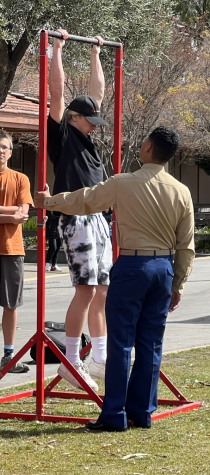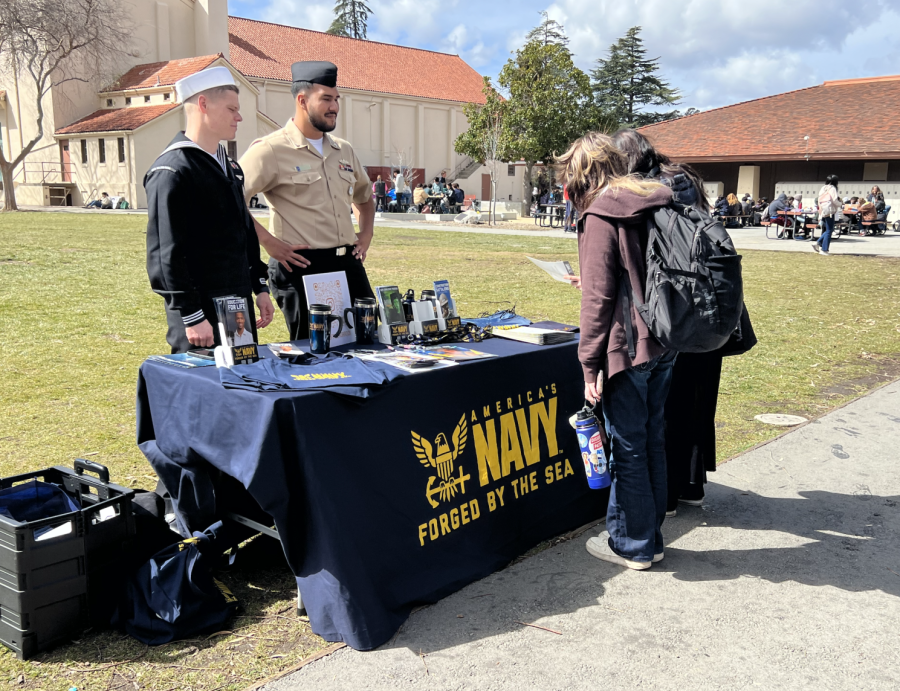Give peace a chance
Recruiters on campus are antithetical to peace
There is no place that is seen as more off limits for violence than school. It is as much a sacred place as any temple: a crime universally condemned in international law if you put it in harm’s way. So, it’s a bit confusing on why, of all places, military recruiters have unlimited access to them.
It’s safe to say that most Palo Alto High School students have been accustomed to the United States military booths that pop up on the Quad during lunch every other month. Both on Club Day and, sometimes, seemingly out of the blue in front of the library. The booths offer pamphlets, posters, and imposing figures of military authority with them. On a good day, they even bring a pull-up bar.
They arrive, setting up a temporary outpost, and leave as quickly as they arrive. We are so accustomed to their presence in a place meant for education that you might barely even bat an eye at them.
Tracing back the roots of military recruitment, particularly in the US, can take us all the way back to the earliest days of America’s emergence. During the Revolutionary War, children were often pressured to become soldiers.
But in a post-9/11 world, military recruitment within schools became a magnitude larger.
The passing of the No Child Left Behind Act in 2002 allowed for recruiters to have full access to “secondary school students names, addresses, and telephone listings,” according to . With this newly acquired information, they were able to find a pool of people to recruit. According to CBS News, nearly one-third of all American soldiers who were mortally wounded in Iraq, the exact number being 8,895, were between the ages of 18 to 21, many of them likely exposed to joining the army through their own school.
It isn’t fearmongering or wrong to say that some of the people who are exposed to US army recruitment will join the military. And, as the American Journal of Public Health put it, those who join as a result of practices “disturbingly similar to predatory grooming,” risk being injured during their service. As history has proven, too often fatally.
Even excluding the possibility of death, 45% of Iraq and Afghanistan veterans had filed claims for permanent disabilities by 2012 according to the National Veterans Foundation, and over 15% were diagnosed with PTSD (Post Traumatic Stress Disorder), according to the U.S. Department of Veterans Affairs. It’s obvious why recruiters on campus generally don’t plaster this fact all over their colorful and meticulously edited brochures.
Detractors of course will offer a plethora of supposed benefits: for example, the offers of educational opportunities that low-income students often do not get. With the average application fee being $45, as stated by an article by U.S. News, this is far out of reach for families living paycheck-to-paycheck. According to a study by the Brookings Institute, the US Army has become an exception to wider wage stagnation, with members earning more than their civilian counterparts.
 Is it not more concerning that we’ve created a pathway to education through the military, one that targets these aforementioned low income students? We routinely condemn the Russian and Chinese governments for these same types of tactics, so why is that we get a pass on this?
Is it not more concerning that we’ve created a pathway to education through the military, one that targets these aforementioned low income students? We routinely condemn the Russian and Chinese governments for these same types of tactics, so why is that we get a pass on this?
All of what I’ve written isn’t some groundbreaking revelation here. In the rest of the Western world, direct recruitment as a practice has been largely abolished. Most European nations now recruit only from eighteen and above, according to Child Soldiers International.
The current geopolitical environment hints towards a renewed cold war between the US, China, and Russia. It’s not inconceivable that there will be renewed military conflict, and many of these students-turned-recruits from across the US may find themselves in battlefield situations. It’s more important to stop this now before these children make not just a career decision, but a life or death decision in the process.
The peaceful doves are gone. The integration of the military into our schools risks undermining peace and turning yet another space into a permanent recruitment outpost. As a student body, no, as a nation, the rejection of this practice should be a top priority. Keep military recruiters off of our campus.
And maybe then the doves will come back.
